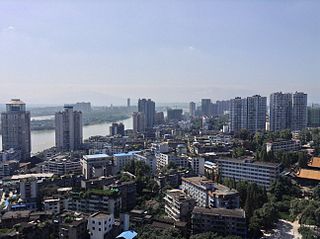
Sichuan, is a province in southwest China occupying most of the Sichuan Basin and the easternmost part of the Tibetan Plateau between the Jinsha River on the west, the Daba Mountains in the north, and the Yungui Plateau to the south. Sichuan's capital city is Chengdu. The population of Sichuan stands at 81 million.

The Megophryidae are a large family of frogs native to the warm southeast of Asia, from the Himalayan foothills eastwards, south to Indonesia and the Greater Sunda Islands in Maritime Southeast Asia, and extending to the Philippines. As of 2014 it encompasses 180 species of frogs divided between 9 genera. For lack of a better vernacular name, they are commonly called megophryids.
Longmen may refer to the following:

Leshan, formerly known as Jiading, is a prefecture-level city located at the confluence of the Dadu and Min rivers in Sichuan Province, China. Leshan is located on the southwestern fringe of the Sichuan Basin in southern Sichuan, about 120 km (75 mi) from Chengdu. At the 2010 census, its population was 3,235,759 whom 662,814 lived in the built-up area made of Shizhong district, as Wutongqiao and Jinkouhe districts are not conurbated yet.

Chengdu Shuangliu International Airport is the major international airport serving Chengdu, the capital of Sichuan province, China. Located about 16 kilometres (10 mi) southwest of downtown Chengdu to the north of Shuangliu District, Shuangliu airport is an important aviation hub for Western China. Shuangliu Airport is one of the two core hubs for Air China, together with Beijing, as well as the main hub and headquarters for Sichuan Airlines and Chengdu Airlines. China Eastern Airlines, China Southern Airlines, Shenzhen Airlines, Lucky Air and Tibet Airlines also have bases at Shuangliu Airport.
Oreolalax is a genus of amphibian in the family Megophryidae. They are mostly endemic to southwestern China with one species in northern Vietnam, possibly extending into adjacent Laos.
Oreolalax major is a species of amphibian in the family Megophryidae.
It is endemic to China and found in Sichuan and Yunnan provinces, between Mount Emei and Hengduan Mountains. It likely exists in Emeishan, Wawushan, Gonggashan, Wolong, and Dujiangyan National Nature Reserves.
Its natural habitats are subtropical moist montane forests and rivers.
It is threatened by habitat loss.
Oreolalax multipunctatus is a species of amphibian in the family Megophryidae. It is endemic to the Mount Emei region in Emeishan and Hongya counties of Sichuan, China.
Its natural habitats are subtropical moist montane forests and rivers.
It is threatened by habitat loss.
Scutiger chintingensis, also known as the Chinting lazy toad or Chinting alpine toad, is an endangered species of amphibian in the family Megophryidae.
It is endemic to the Mount Emei region of Sichuan, China.

Emeishan is a county-level city in Sichuan province, China. It is administered by the prefecture-level city Leshan. Its population in 1990 stood at 396,445. It is named after Mount Emei, a famous mountain located within its administration.
Cosmopterix rhyncognathosella is a moth of the family Cosmopterigidae. It is known from Russia, China and Japan.
Gaoqiao may refer to the following entities in China:

Xixiang Chi, also known as Tianhua Chanyuan, is one of the most important Buddhist temples on Mount Emei in Emeishan City, Sichuan, China. The temple is located more than 2,000 metres above sea level. The monastery was founded in the Ming dynasty and was expanded during the reign of the Kangxi Emperor in the Qing dynasty. The name of the temple comes from a legend which says that the bodhisattva Samantabhadra once bathed his steed, a white elephant, in a pond near the temple. "Night Moon over the Elephant washing pond" is one of the ten sceneries of Mount Emei. When the moon is shining brightly at night and is reflected in the water, it creates an illusion where the viewer feels like he/she is in Heaven. Important buildings in the temple are the Maitreya Hall, Main Hall, Guanyin Hall, "Tripitaka Pavilion" (library) and guest cottage.

Jiazhou or Jia Prefecture was a zhou (prefecture) in imperial China seated in modern Leshan, Sichuan, China. It existed (intermittently) from the 6th century to 1196. Between 742 and 758 it was known as Qianwei Commandery (犍為郡).
Zhong Mian is a Chinese politician from Sichuan province who served as the executive vice governor of the province between 2013 and 2015; since May 2015, he has served as the Deputy Party Secretary of Yunnan province.

Baoguo Temple is a Buddhist temple located on Mount Emei, in Emeishan City, Sichuan, China. It is the site of the Buddhist Association of Mount Emei. The temple mainly enshrines Buddhist deities as well as deities of both Confucian and Taoism, which makes rarely seen temple temple of three religious.
Paul Lei Shiyin is the current Chinese Catholic bishop of Leshan.








